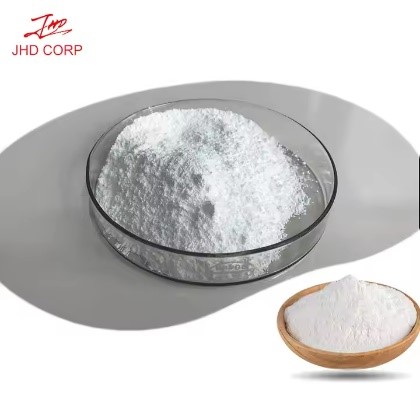Welcome to JHD Nutrasource!
Shop
Aspartame Powder
Aspartame is a low-calorie artificial sweetener with the chemical name N-α-L-Aspartyl-L-phenylalanine 1-methyl ester and the chemical formula C14H18N2O5. It appears as a white powder at room temperature and is approximately 180 to 220 times sweeter than sucrose. Aspartame is commonly used as a sugar substitute in various food and beverage products due to its low caloric content and high sweetness.
Description
Function
- Low Calorie and High Sweetness:
- Aspartame has a very low caloric value (approximately 4186 kJ/kg, compared to sucrose’s 16.75 kJ/g), making it suitable for individuals managing their weight or blood sugar levels. Its high sweetness allows manufacturers to use much smaller quantities to achieve the desired sweetness.
- Flavor Enhancement:
- Aspartame enhances the flavor of certain foods and beverages, particularly acidic fruit flavors. It works well with natural flavorings and can extend the sweetness duration in products like chewing gum.
- Safety and Metabolism:
- Aspartame is metabolized into three common components: aspartic acid, phenylalanine, and methanol. These components are quickly absorbed and metabolized in the body without accumulating. It is considered safe for consumption by regulatory bodies worldwide, including the FDA and JECFA.
- Dental Health:
- Unlike sugar, aspartame does not contribute to tooth decay, making it a preferred sweetener for dental health.
Application
- Beverages:
- Aspartame is widely used in carbonated drinks, fruit juices, and other beverages to provide sweetness without adding significant calories.
- Food Products:
- It is used in a variety of food products, including yogurt, ice cream, and dairy desserts, to create low-calorie or sugar-free versions.
- Confectionery:
- Aspartame is commonly found in chewing gum, hard candies, and chocolate coatings due to its ability to enhance flavor and sweetness.
- Pharmaceuticals:
- In medications, aspartame is used to mask the unpleasant taste of drugs, making them more palatable, especially for children.
- Dietary Supplements:
- It is used in dietary supplements and meal replacements to provide sweetness while keeping the caloric content low.
- Tabletop Sweeteners:
- Aspartame is available as a tabletop sweetener in packets, bulk form, or tablets for consumers to add to beverages or food.

